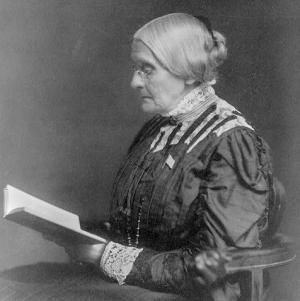
 Susan B. Anthony came to Cortland County in 1879 to deliver a speech on political equity titled “Women want bread, not the ballot.” Anthony’s speech argued that while winning the vote nationally would be a milestone, the real target of voting equality ensures that women would soon have political and financial mobility. Economic freedom was a major sentiment of this time. She also visited again in 1894 alongside Harriet May Mills. Anthony's speech included remarks on achieved suffrage in the states of Colorado and Wyoming as examples. She also went on to describe how the movement could have used more outspoken men, specifically young men. Additionally, many preachers, politicians, and editors silently supported the cause, but they seemingly lack the public courage to use their power to remedy a lack of equality.
Susan B. Anthony came to Cortland County in 1879 to deliver a speech on political equity titled “Women want bread, not the ballot.” Anthony’s speech argued that while winning the vote nationally would be a milestone, the real target of voting equality ensures that women would soon have political and financial mobility. Economic freedom was a major sentiment of this time. She also visited again in 1894 alongside Harriet May Mills. Anthony's speech included remarks on achieved suffrage in the states of Colorado and Wyoming as examples. She also went on to describe how the movement could have used more outspoken men, specifically young men. Additionally, many preachers, politicians, and editors silently supported the cause, but they seemingly lack the public courage to use their power to remedy a lack of equality.
Susan B. Anthony,
Courtesy of the National
Women's History Museum
 Lillie Deveraux, President of the New York State Women’s Suffrage Association spoke at Cortland in 1885. She argued for female enfranchisement and co-education. In her speech, titled “New Republic” she spoke of women with the burden of taxation without representation.
Lillie Deveraux, President of the New York State Women’s Suffrage Association spoke at Cortland in 1885. She argued for female enfranchisement and co-education. In her speech, titled “New Republic” she spoke of women with the burden of taxation without representation.
Like Anthony, who spoke in Cortland in the late 1880’s, Deveraux enthusiastically endorsed political equity, whose argument was not just about gaining the right to vote but ensuring future rights and privileges leading to a more equitable society.
Lille Devereux Blake,
Courtesy of the Feminist Press, CUNY.

Harriet May Mills
Courtesy of the Historic Mills House